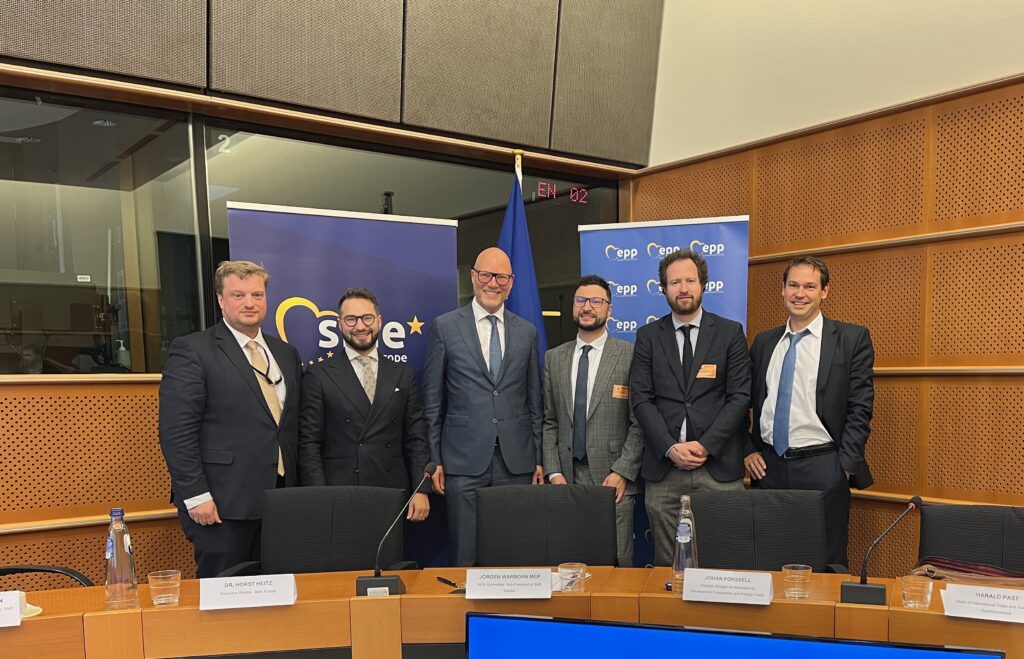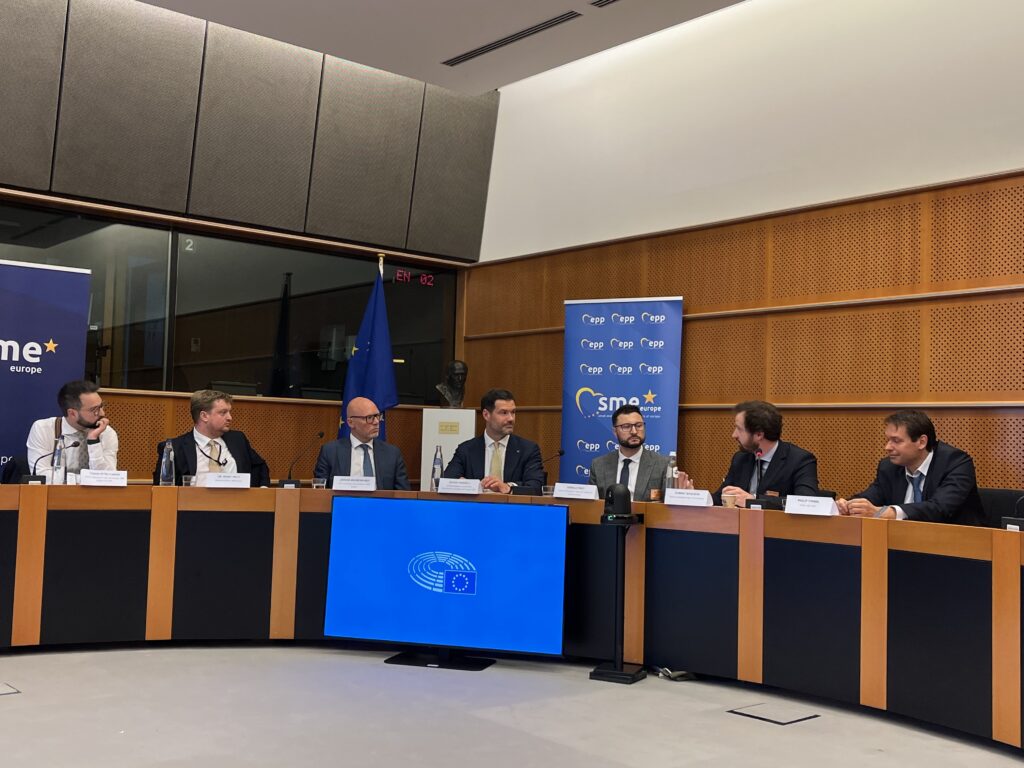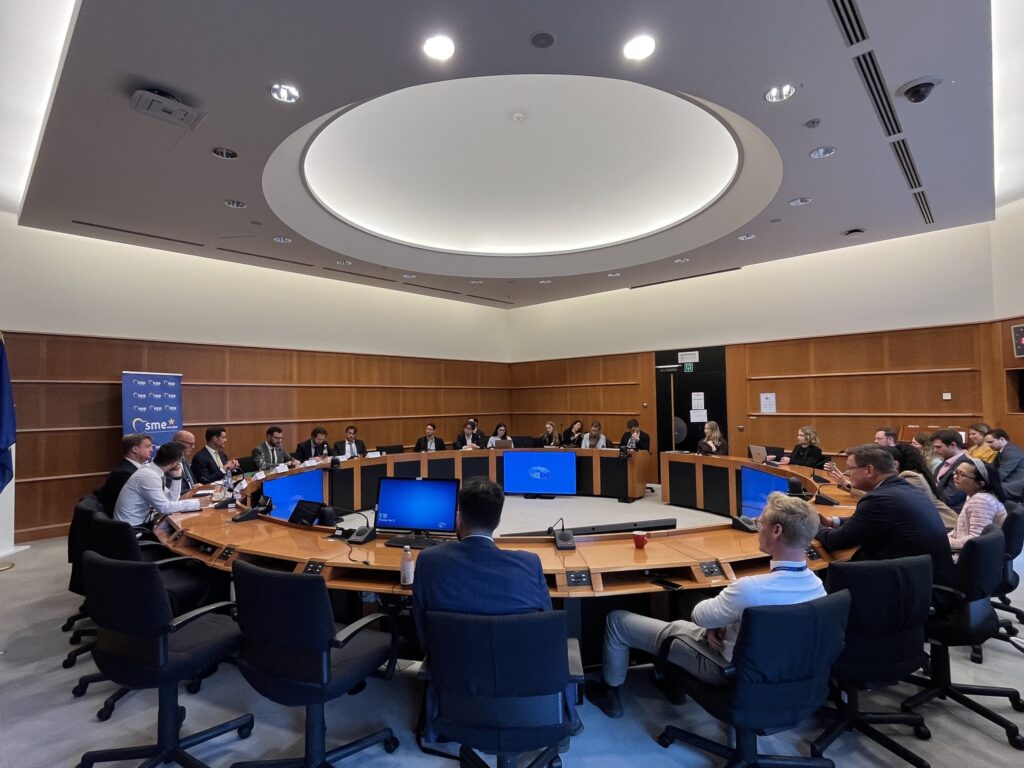Swedish Presidency 2023: SMEs’ Competitiveness & International Trade

On Thursday May 25th, SME Europe of the EPP organized a debate on “Swedish Presidency 2023: SMEs’ Competitiveness & International Trade” in European Parliament, hosted by Jörgen WARBORN, Member of the European Parliament, INTA Committee, Vice-President of SME Europe.
The panel was moderated by Tudor Petru FABIAN, Advisor of International Trade and Security, SME Europe; and the participation of Johan FORSSELL, Swedish Minister for International Development Cooperation and Foreign Trade; Jörgen WARBORN MEP, INTA Committee, Vice-President of SME Europe; Harald PAST, Head of International Trade and Taxation at EuroCommerce; Dominic BOUCSEIN, Head of International Trade at EuroChambres; Philip TORBØL, Partner at K&L Gates.
Jörgen WARBORN, Member of the European Parliament, opened the seminar by stating that he agrees with Sweden putting competitiveness on the top of the agenda during Swedish Presidency. Europe needs to provide leadership and avoid protectionist measures in order to strengthen the World Trade Organization and foster free trade agreements. There is a need to prioritize finalizing and ratifying agreements with countries like New Zealand, Australia, Mexico, Chile, and the Mercosur Agreement, while also focusing on supporting SMEs to enhance their competitiveness and increase trade opportunities.
The event’s moderator, Tudor Petru FABIAN, advisor of International Trade and Security, argued that when we delve into the topic of competitiveness in SMEs and international trade, it becomes evident that survival in this globally connected arena is intricately tied to one’s ability to compete. SMEs, often considered the backbone of the economy, play a vital role in job creation, innovation, and social harmony. Mr. Fabian noted that while SMEs are vulnerable in these troubled times, they also possess the potential to generate significant long-term value. Therefore, it is imperative that we focus on their well-being, particularly in the aftermath of the COVID-19 pandemic. International trade not only brings economic prosperity but also serves as a geo-strategic tool for external action. Moreover, the interconnectedness of trade and security has become increasingly apparent, necessitating risk mitigation and supply chain diversification strategies.

Johan FORSSELL, Swedish Minister for International Development Cooperation and Foreign Trade, continued the debate acknowledging the importance of international trade and the single market. He highlighted the significant contribution of the single market to exports and imports, emphasizing its role in stimulating growth and making life easier for businesses, citizens, and consumers. Mr. Forssell mentioned ongoing negotiations with various countries such as Indonesia, India, Australia, Chile, Mexico, and Mercosur and the progress made in the Free Trade Agreement with New Zealand, which is set to be signed.
Mr. Forssell emphasized the importance of digitalization, standardization, and skills development, including lifelong learning, to equip the EU workforce for future challenges. Additionally, he stressed the need to reduce regulatory burden, particularly in the service sector, to close the growth and innovation gap between Europe and its global competitors. He also mentioned the importance of Ukraine and the agreement to review the suspension of custom duties, highlighting the significance of economic ties with Ukraine.
Harald PAST, head of International Trade and Taxation at EuroCommerce, pointed out that there is a need for simplified and harmonized trade policies, particularly in relation to rules of origin. Complicated rules of origin act as trade barriers, especially for SMEs. Working towards global standardization and streamlining of origin rules would greatly benefit businesses. Mr. Past added that to improve the utilization rate of trade agreements, better information sharing is required. Both the European Union and its member states should take responsibility for effectively informing companies about existing trade opportunities. This would enable businesses, especially SMEs, to capitalize on the benefits offered by trade agreements.
He also stressed that special attention should be given to SMEs, ensuring that trade policies and initiatives are easily accessible and beneficial to them. For example, introducing concepts like the Trust & Check trader, which simplifies customs procedures and eliminates the need for complex declarations, can be beneficial for small businesses. Making such tools easily accessible to SMEs would help them take advantage of trade benefits.
Dominic BOUCSEIN, head of International Trade at EuroChambres, continued with bringing out that European businesses face the crisis emerging from Ukraine, thus we should work closely with the Ukrainian Chamber of Commerce to provide support and assistance during these difficult times. To address the challenges of decelerating growth, high inflation rates, shortage of labor, and digital skill gaps impacting SMEs, the Chamber network should leverage its resources to offer relevant training programs and support for upskilling. Mr. Boucsein said that in the face of increasing protectionism and favoritism towards domestic companies globally, Europe must adopt a proactive and comprehensive approach at the multilateral level, emphasizing incentives rather than punitive measures, to encourage collaboration and growth. Additionally, streamlining regulations and implementing national action plans with the involvement of businesses and stakeholders will enhance competitiveness and facilitate smoother trade operations for SMEs.
Philip TORBØL, partner at K&L Gates, brought out the intentions expressed by the previous speakers and believes that everyone has been emphasizing the importance of free trade. As a lawyer with two decades of experience in trade, Mr. Torbøl acknowledged that the landscape has changed, particularly after Trump’s election, causing the EU to reassess its position and approach to global markets.

Mr. Torbøl said that there were instances of naivety in the past regarding trade agreements, with some commissioners initially advocating for stronger ties with China but later becoming frustrated with the lack of progress. He recognized that the Commission alone cannot be blamed for the challenges faced in trade negotiations. Structural problems and conflicting intentions from various stakeholders also contribute to the difficulty in achieving comprehensive agreements. Therefore, he suggested adopting a more pragmatic and realistic approach to free trade, focusing on securing trade agreements before pursuing ambitious goals.

